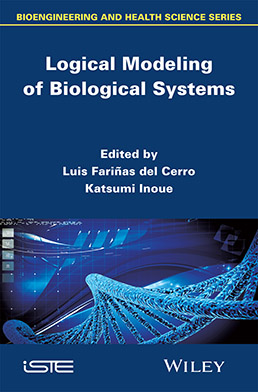
Systems Biology is the systematic study of the interactions between the components of a biological system and studies how these interactions give rise to the function and behavior of the living system. Through this, a life process is to be understood as a whole system rather than the collection of the parts considered separately. Systems Biology is therefore more than just an emerging field: it represents a new way of thinking about biology with a dramatic impact on the way that research is performed. The logical approach provides an intuitive method to provide explanations based on an expressive relational language.
This book covers various aspects of logical modeling of biological systems, bringing together 10 recent logic-based approaches to Systems Biology by leading scientists. The chapters cover the biological fields of gene regulatory networks, signaling networks, metabolic pathways, molecular interaction and network dynamics, and show logical methods for these domains based on propositional and first-order logic, logic programming, answer set programming, temporal logic, Boolean networks, Petri nets, process hitting, and abductive and inductive logic programming.
It provides an excellent guide for all scientists, biologists, bioinformaticians, and engineers, who are interested in logic-based modeling of biological systems, and the authors hope that new scientists will be encouraged to join this exciting scientific endeavor.
1. Symbolic Representation and Inference of Regulatory Network Structures, Nataly Maimari, Krysia Broda, Antonis Kakas, Rob Krams and Alessandra Russo.
2. Reasoning on the Response of Logical Signaling Networks with ASP, Torsten Schaub, Anne Siegel and Santiago Videla.
3. A Logical Model for Molecular Interaction Maps, Robert Demolombe, Luis Farinas Del Cerro and Naji Obeid.
4. Analyzing Large Network Dynamics with Process Hitting, Loic Paulevé, Courtney Chancellor, Maxime Folschette, Morgan Magnin and Olivier Roux.
5. ASP for Construction and Validation of Regulatory Biological Networks, Alexandre Rocca, Nicolas Mobilia, Éric Fanchon, Tony Ribeiro, Laurent Trilling and Katsumi Inoue.
6. Simulation-based Reasoning about Biological Pathways using Petri Nets and ASP, Saadat Anwar, Chitta Baral and Katsumi Inoue.
7. Formal Methods Applied to Gene Network Modeling, Gilles Bernot, Jean-Paul Comet and El Houssine Snoussi.
8. Temporal Logic Modeling of Dynamical Behaviors: First-Order Patterns and Solvers, François Fages and Pauline Traynard.
9. Analyzing SBGN-AF Networks using Normal Logic Programs, Adrien Rougny, Christine Froidevaux, Yoshitaka Yamamoto and Katsumi Inoue.
10. Machine Learning of Biological Networks Using Abductive ILP, Alireza Tamaddoni-Nezhad, Dianhuan Lin, Hiroaki Watanabe, Jianzhong Chen and Stephen Muggleton.
Luis Fariñas del Cerro is CNRS research director and a member of the LILaC Group of IRIT at Paul Sabatier University in France.
Katsumi Inoue is Professor, Principles of Informatics Research Division, National Institute of Informatics, Japan.